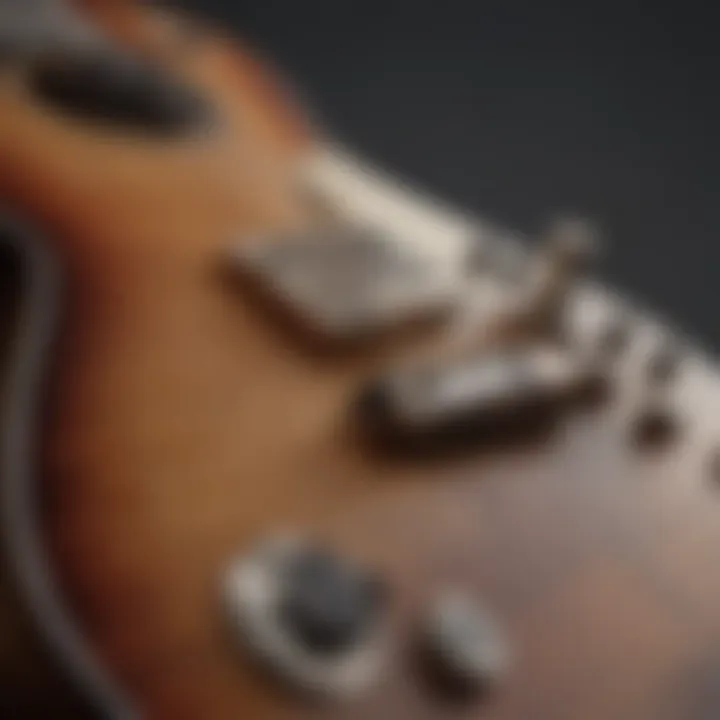Exploring Jean Paul Guitars: Craftsmanship and Influence


Intro
Jean Paul guitars have gained recognition in the music world for their distinct craftsmanship and unique designs. The instruments produced by this brand not only stand out for their aesthetic qualities but also for their sound quality and performance. As we explore the nuances of Jean Paul guitars, we will examine their craftsmanship, innovation, and the significant influence they have had on various music genres. This article aims to shed light on the key aspects that make Jean Paul guitars a favored choice among both aspiring and professional musicians.
Artist Profile
Biography and Background
Founded recently, Jean Paul guitars have rapidly made a mark in the musical landscape. The vision behind the brand is to create instruments that resonate well with players of diverse skill levels. Jean Paul emphasizes quality materials and meticulous production processes, ensuring each guitar meets high standards. While the company is still relatively new, it has attracted a loyal following due to its commitment to excellence.
Major Influences and Inspirations
Jean Paul guitars draw inspiration from several sources. One major influence is traditional guitar craftsmanship. The brand integrates classic design elements with modern technology, creating instruments that appeal to contemporary musicians. Additionally, they look to various music genres for inspiration, striving to meet the specific needs of players in styles like jazz, rock, and classical.
"Innovation in guitar design is a journey that never truly ends, and Jean Paul thrives on this principle."
Craftsmanship
Design Philosophy
The design philosophy at Jean Paul revolves around balance between aesthetics and functionality. The guitars feature elegant lines and finishes that not only catch the eye but also enhance playability. Each model is designed with specific features tailored to various playing styles, ensuring that every guitarist finds an instrument suited to their needs.
Materials Used
In producing their guitars, Jean Paul sources high-quality materials. This includes solid woods that offer resonance and durability. Rosewood and mahogany are commonly used for the body and neck, providing a rich sound. Additionally, the brand uses premium strings and hardware to enhance the overall performance of their instruments.
Innovation
Technological Advancements
Jean Paul guitars incorporate various technological advancements into their design and production. This includes electric models that feature built-in pickups, allowing for seamless amplification. Innovations like these enable musicians to easily adapt their sound to different environments, whether in a studio or a live performance setting.
Unique Features
The uniqueness of Jean Paul guitars lies in the attention to detail in features like neck contours and fretboard design. These elements play crucial roles in playability. Players often appreciate options such as adjustable truss rods that allow for personalized adjustments to the instrument's setup.
Cultural Influence
Impact on Music Genres
Jean Paul guitars have found a place in various music genres. Their versatility allows musicians from different backgrounds to incorporate these instruments into their work. From soft acoustic melodies to powerful rock solos, Jean Paul guitars adapt well to the needs of different musical styles.
Contributions to Guitar Playing Evolution
The emergence of Jean Paul guitars coincides with a renewed interest in guitar craftsmanship and innovation. Musicians today seek instruments that not only perform well but also inspire creativity. The brand’s emphasis on quality and innovation has contributed to a broader appreciation for finely crafted guitars in today’s music scene.
Ending
The exploration of Jean Paul guitars reveals not only their craftsmanship but also their significant role in the music community. As they evolve and adapt, these instruments continue to inspire musicians at all levels. Their dedication to quality and performance positions them as a noteworthy option in a competitive market.
Preface to Jean Paul Guitars
Jean Paul Guitars has carved a unique niche within the realm of musical instruments. Their importance not only comes from the quality of the guitars they produce but also from their contributions to both musicianship and sound innovation. For anyone interested in guitars, understanding Jean Paul is essential.


This section will provide insights into the origin of Jean Paul Guitars and the philosophy that drives their craftsmanship. Through this exploration, readers will gain an appreciation of the intricate relationship between the guitar, its maker, and its music. The discussion will emphasize key elements that make the brand noteworthy, considering both the historical perspective and its relevance in today's musical landscape.
The Origin of Jean Paul Guitars
Founded in a time when guitar technology began evolving, Jean Paul Guitars emerged with a vision to blend traditional craftsmanship with modern innovation. The brand started in the early 2000s, founded by individuals passionate about music and design. Their goal was clear: to create instruments that not only sound good but also resonate with players on a personal level.
Throughout the years, Jean Paul Guitars has focused on refining their production methods while maintaining craftsmanship integrity. Many models honor classical guitar making techniques, ensuring that each instrument embodies both resilience and artistry. The influence of world music further shapes their approach, resulting in guitars that appeal to a broad audience, from traditionalists to modern players.
Philosophy Behind the Craft
The philosophy at Jean Paul Guitars emphasizes the belief that every guitar tells a story. This guiding principle influences their design and production processes. The makers instill their instruments with purpose, aiming to create not just tools for music, but bridges to emotional expression.
To achieve this, they focus on several aspects:
- Quality of materials: Each guitar is constructed using selected woods that offer distinctive tonal qualities. Choices like spruce or mahogany accentuate sound clarity and richness.
- Attention to detail: Every step of production, from shaping the body to tuning the strings, is taken with precision. This meticulous approach results in outstanding instruments tailored to blend well in various musical environments.
- Sustainability: Jean Paul Guitars acknowledges the importance of sustainability in today’s world. The brand is committed to sourcing materials responsibly and ensuring their production processes are environmentally friendly.
Craftsmanship and Design
Craftsmanship and design are central to understanding the unique allure of Jean Paul guitars. These aspects do not merely serve aesthetic purposes; they also greatly influence performance, sound quality, and playability. The company has made a name for itself through its commitment to detailed craftsmanship. Each instrument is a testament to careful planning, skilled handwork, and innovative techniques. This combination elevates the instruments beyond mere tools for musical expression to true works of art.
Materials Used
The selection of materials is critical in guitar manufacturing. Jean Paul Guitars stands out by using high-quality woods and components sourced from sustainable environments. For instance, the tops of acoustic guitars often use solid sitka spruce or cedar, known for their resonance and tonal clarity. The back and sides are typically constructed from mahogany or rosewood, providing warmth and richness to the sound.
In the case of electric guitars, the body is often made from alder or ash, which contributes to a balanced tone. The hardware is also carefully chosen, featuring durable materials that enhance performance. Using quality materials not only supports the craftsmanship but also ensures longevity of the instruments, making them reliable for musicians.
Innovative Features of Jean Paul Guitars
Jean Paul guitars are equipped with several innovative features that cater to modern musicians. One significant aspect is the inclusion of advanced pickup systems in electric models. This improves sound capture and allows for a broader range of tones. Additionally, the design often incorporates ergonomic shapes that allow for easier handling during performances.
Another innovation is the use of unique bridge and neck designs, which optimize playability and string action. These features may include adjustable truss rods, allowing players to customize their instruments for optimal performance. Such advancements reflect a thoughtful approach to design, addressing both the technical needs of musicians and their creative expressions.
Artisanal Techniques
The artisanal techniques employed in creating Jean Paul guitars play a vital role in their overall quality. Skilled luthiers apply traditional methods alongside modern technology while crafting each instrument. For example, hand-sanding and careful finishing work ensure that the feel of the guitar is of the highest standard.
Moreover, Jean Paul emphasizes the importance of individual craftsmanship. Each guitar undergoes a rigorous quality control process that looks at everything from sound testing to structural integrity. This dedication to artisan craftsmanship ensures that every guitar produced is not just a product but a carefully crafted instrument designed for artistic excellence.
"Every detail matters in the making of a guitar. It is this synergy between craftsmanship and design that defines the identity of Jean Paul guitars and their influence on music today."
By investing in quality materials, innovative features, and artisanal techniques, Jean Paul guitars fulfill the expectations of both professional musicians and hobbyists alike, making each instrument truly unique.
Types of Jean Paul Guitars
Understanding the various types of Jean Paul Guitars is crucial for anyone interested in music or guitar playing. Each type caters to distinct styles, preferences, and technical requirements of musicians. This section presents a detailed look into the different models available, their unique characteristics, and the advantages they offer.
Acoustic Models
Acoustic guitars from Jean Paul are known for their warm sound and rich tonal quality. They are crafted from high-quality woods that contribute to their resonance and durability. The use of solid tops paired with layered back and sides enhances projection, making these guitars suitable for performances in various settings.
One significant feature of Jean Paul acoustic models is their comfortable neck profile. This design considers the ergonomics needed for easy playability, especially for beginners. Many acoustic models also integrate electronics, allowing for amplification without sacrificing sound quality.
The unique craftsmanship ensures that every string resonates beautifully, creating a rich acoustic experience.


Electric Models
Jean Paul electric guitars offer a diverse array of options for rock, blues, and metal enthusiasts. These guitars are built with powerful pickups that deliver crisp and clear sound. This makes them popular choices for performances and recordings.
The designs often include features such as humbuckers or single-coil pickups, giving players flexibility in achieving their preferred sound. Many models also have adjustable components, allowing musicians to modify setup and tone. This adaptability is vital for performing across different genres.
In addition, Jean Paul's attention to 🛠️ detail during the production process ensures that every electric model retains reliability and performance consistency.
Signature Series
Jean Paul also offers a Signature Series, which showcases guitars designed in collaboration with renowned artists. These models not only reflect the personal preferences of musicians but also incorporate unique features that set them apart.
Each guitar in this series often includes custom artwork, specific hardware, and tailored specifications that resonate with the artist's style. By choosing a guitar from the Signature Series, musicians can own a piece of memorabilia that combines artistry and performance.
In summary, the Signature Series appeals to both collectors and players looking for a distinctive sound and aesthetic. Each model tells a story, blending personal influence with Jean Paul's commitment to quality.
Culmination
Overall, the variety of Jean Paul guitars includes acoustic models, electric models, and specialized Signature Series, catering to musicians of all levels. Every type reflects a commitment to quality craftsmanship and innovative design, making Jean Paul Guitars a significant player in the world of music.
Cultural Impact of Jean Paul Guitars
The cultural influence of Jean Paul Guitars extends far beyond the realm of instrument manufacturing. This brand successfully resonates with various music movements and genres, contributing significantly to their evolution. The unique designs, coupled with exceptional craftsmanship, have made Jean Paul Guitars a favorite among musicians, fostering a connection that enriches both their personal expression and the wider musical landscape.
Influence on Music Genres
Jean Paul Guitars have carved a niche within different music genres. Each model exhibits specific characteristics that cater to various styles, whether it is acoustic for folk and country, or electric for rock and blues. This adaptability allows musicians to explore and create new sounds. For example, acoustic models provide warmth and resonance necessary for fingerpicking styles, while electric guitars offer the sustain and versatility needed for more dynamic performances.
Musical innovation thrives on exploration. The accessibility of Jean Paul instruments empowers budding musicians to experiment with their sound. Over the years, their guitars have been adopted by acclaimed artists in pop, jazz, and even metal genres, further solidifying their significance in today’s music scene. The brand’s influence not only nurtures creativity, but also highlights the evolving nature of music itself.
Endorsements by Notable Musicians
The endorsement of Jean Paul Guitars by prominent musicians enhances its credibility in the industry. Artists such as Joe Satriani and Lita Ford have expressed their preference for specific Jean Paul models, attributing part of their musical journey to the brand's instruments. Their positive experiences with Jean Paul Guitars not only serve as testimonials but also inspire upcoming musicians to consider this brand when selecting their instruments.
"I have always appreciated the quality of Jean Paul guitars. They are reliable and versatile, which speaks to my style as a musician." – Joe Satriani.
These endorsements play a crucial role in marketing and reaching new audiences. Aspiring musicians often seek tools used by their heroes, which makes these endorsements tremendously impactful. It builds a connection between the music legends and the brand, enhancing the desirability of Jean Paul Guitars among fans and amateur players alike.
Guitarists’ Testimonials
Personal accounts from guitarists amplify the cultural impact of Jean Paul. Many artists emphasize the importance of playability and comfort in their testimonials. Several state that Jean Paul Guitars enhance their performance significantly. Players report that the ergonomic designs reduce fatigue while practicing for long hours.
Consider the words of a passionate musician:
"The moment I picked up a Jean Paul guitar, I felt a connection. It was like the instrument understood what I wanted to express, making it easier to create music that resonates with my audience."
This sentiment is echoed in countless reviews and discussions on platforms such as Reddit and Facebook, where musicians share their experiences. These voices collectively contribute to a growing narrative about the brand, reinforcing its importance in today’s cultural fabric.
Technical Aspects and Performance
The technical aspects of Jean Paul guitars are vital to understanding their appeal among musicians. These elements include sound quality, tone, playability, and comfort. Each characteristic plays an essential role in how musicians connect with their instruments, which in turn affects their overall performance and enjoyment. By examining these aspects, one can appreciate not just the craftsmanship but also the thoughtful engineering that goes into every Jean Paul guitar.
Sound Quality and Tone
Sound quality is arguably one of the most important factors when selecting a guitar. Jean Paul guitars are known for their excellent acoustics, which provide a rich and full sound. The materials used in construction, such as solid wood for the soundboard, significantly influence tonal qualities. The resonance and clarity produce particular warmth that appeals to both casual players and professionals.
Another facet of sound quality is the tonal range available. Jean Paul guitars manage to offer a variety of tones suitable for different styles of music. This versatility is especially important for musicians who often switch genres, as they can rely on their guitar to adapt without compromising their sound.


"A guitar is not just an instrument; it is an extension of one's musical expression."
Regarding sound projection, Jean Paul guitars deliver powerful sound that can be appreciated even in large venues. This attribute makes them favorable for both solo performances and band settings. Musicians can trust that their sound will carry without losing its quality.
Playability and Comfort
In addition to sound quality, playability is critical. Guitarists need an instrument that responds well and feels comfortable during play. Jean Paul guitars are known for their smooth necks and well-placed frets, contributing to effortless playability. The setup of the strings also allows for easy action, making it simpler for beginners and experienced players alike to perform complex fingerings.
Comfort is another consideration when evaluating a guitar's design. Jean Paul guitars are constructed with body shapes that fit well against the player. This ergonomic design reduces fatigue during extended play sessions. Whether fingerpicking or using a plectrum, players will find that the layout aids their technique and expression.
In addition, weight plays a role in comfort. Many Jean Paul models are lightweight, allowing players to move around freely on stage or during practice. When a musician can focus on their performance rather than wrestle with the weight of their instrument, it truly enhances the experience.
Market Position and Accessibility
The market position of Jean Paul guitars illustrates their role and significance within the broader music industry. Understanding this aspect is vital for musicians, collectors, and enthusiasts alike. The accessibility of these instruments reveals how they cater to a diverse audience while maintaining a level of quality and innovation that attracts both novice and experienced players.
Jean Paul guitars occupy a unique and commendable space in the market. They are recognized for offering a quality product at a competitive price point, which resonates with a large segment of guitar players. This balance between quality and affordability fosters a favorable perception. In addition, the brand's commitment to craftsmanship ensures that consumers feel they are investing in an instrument that offers both value and performance.
Price Range and Value
When evaluating the price range of Jean Paul guitars, it becomes clear that they are designed for accessibility without sacrificing musical integrity. Generally, the prices for Jean Paul guitars range from around $150 to over $600, depending on the model and features. This range makes them financially attainable for many aspiring musicians.
"Quality craftsmanship is essential, but accessibility ensures that everyone has the chance to create music."
The competitive pricing strategy allows newcomers to explore their musical potential while providing options for more serious players seeking higher-end models. The value proposition is enhanced by the features present in these guitars, often found in more expensive brands. Factors that contribute to value include:
- High-quality tonewoods used for construction.
- Innovative design elements that improve playability.
- Attention to detail in finishing and setup, ensuring optimal performance.
Availability and Distribution
Jean Paul guitars are widely available, enabling access across various territories. Their distribution model involves partnerships with both brick-and-mortar music stores and online platforms, making it easier for customers to find desired models. Popular online retailers such as Amazon and Sweetwater often stock these guitars, providing reviews and detailed descriptions that aid buyers in making informed decisions.
The global reach of Jean Paul guitars facilitates the spread of their influence across diverse musical communities. Availability isn't just about location. It also refers to the models—different players may look for acoustic, electric, or specialty guitars. The brand's approach to ensuring a breadth of options means musicians can find specific instruments tailored to their preferences.
In summary, the market position and accessibility of Jean Paul guitars highlight their significant role in democratizing access to quality musical instruments. Their pricing structure, distribution strategies, and commitment to excellence position them well within the vibrant landscape of guitar makers.
Closure: The Future of Jean Paul Guitars
The future of Jean Paul Guitars is a topic worthy of deep consideration. This section discusses evolving technologies in guitar production and the company's commitment to quality and sustainability. These elements are crucial not just for the brand itself but also for the entire music community.
Evolving Technologies in Guitar Production
As technology advances, so does the production of musical instruments. Jean Paul Guitars integrates modern manufacturing processes and innovative techniques to enhance their product lineup. The use of computer-aided design allows for precision in crafting instruments that were previously difficult to achieve. This includes more intricate designs, improved ergonomics, and customized features to suit individual musician preferences.
New materials also play a significant role. For instance, advancements in synthetic materials offer durability and weight reduction without sacrificing sound quality. Furthermore, 3D printing technology is slowly entering the guitar market. This tech opens the door for unique shapes and designs, making guitars not only functional but also artistic statements.
In addition, digital technology enhances the playing experience. Instruments may now incorporate built-in tuners, metronomes, or connectivity features that allow for recording or effects processing. This fusion of tradition with modernity gives Jean Paul Guitars a competitive edge and solidifies their place in the future of music.
Commitment to Quality and Sustainability
An essential aspect of the future for Jean Paul is their unwavering commitment to quality and sustainability. Consumers today are more informed and care about the environmental impact of their purchases. Jean Paul Guitars aims to address this concern by sourcing materials responsibly. They focus on using sustainable woods and actively participate in reforestation efforts.
Moreover, their rigorous quality control ensures that each instrument meets high standards. This process combines traditional craftsmanship with modern technologies, fostering a culture of excellence. By prioritizing quality, the brand builds trust with musicians.
Jean Paul understands that sustainability extends beyond materials. They are invested in creating processes that reduce waste and energy consumption in production. Such initiatives are increasingly important in attracting environmentally conscious customers.
"The future of musical instruments will hinge on balancing innovation with environmental responsibility."
In closing, the expansion of Jean Paul Guitars into new technologies while maintaining dedication to sustainable practices positions them well for future growth. They not only cater to the present needs of musicians but also embrace a vision that considers long-term impacts on society and the planet.







